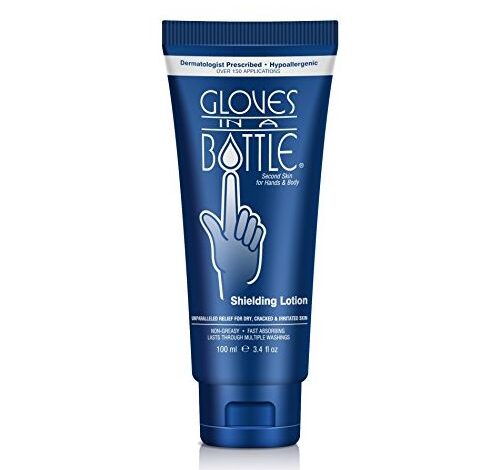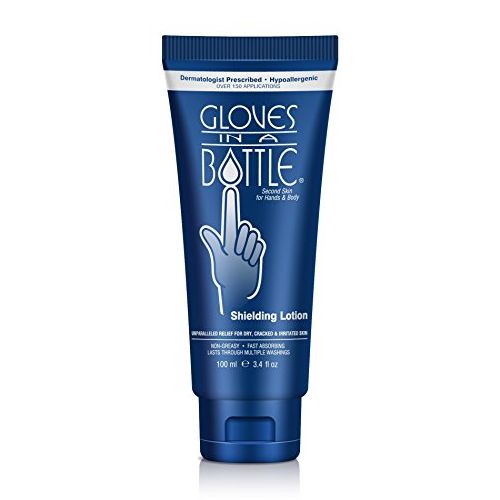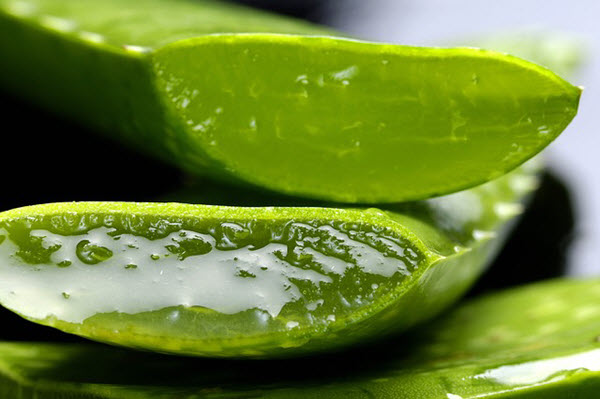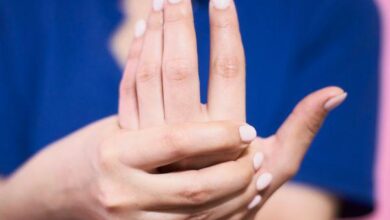Nurse Hacks: 6 Solutions to Dry And Cracked Hands

Handwashing is a crucial part of being a nurse (1). No matter what area or department you’re in, you’ll need to wash your hands to avoid spreading bacteria and prevent contamination.
Unfortunately, constant handwashing can leave your hands dry, cracked, and painful. And if you fail to do something about it, you might even end up with bleeding and infection.
To make sure none of those things happen, we’re sharing with you 6 clever solutions to soothe your dry hands.
Hack #1- Moisturize, moisturize, moisturize…
Because washing your hands can remove the natural moisture of the skin, it’s important that you apply moisturizers after every wash. If you haven’t tried Gloves in a Bottle yet, then you definitely should.

In general, there are 4 different types of moisturizers based on ingredients.
Humectants refer to those ingredients that are capable of absorbing and binding water molecules to themselves. They are a big help in making the skin more resistant to insults (2).
Emollients, on the other hand, are ingredients that enhance the appearance and texture of the skin. They have the ability to fill out the tiny cracks and crevices to make the skin smoother and softer.
Creating a protective seal over the skin, occlusives are ingredients that prevent moisture loss. They are considered as the heaviest of the four types and they leave this greasy feeling after application.
The fourth type is the ceramides. These ingredients work as a glue to keep the structure of the skin intact (3).
In soothing your dry hands, it’s a good idea to invest in a hand lotion that has a combination of those ingredients, like Gloves in a Bottle. The name is very apt because it’s able to bond with the dead skin cells on your skin to create an invisible pair of gloves that’ll prevent moisture loss and protect the layers of your skin.
Hack #2- Be gentle in washing your hands.

As much as possible, use warm water instead of hot water. Washing your hands with hot water strips away the natural oils of the skin. These oils act as a barrier and protect the outer layer of the skin.
On the same note, don’t use cold water when washing your hands. It will just leave your hands even drier.
Apart from water temperature, you also need to be careful about the products you use to wash your hands. Skip harsh soaps and pick something milder for your skin.
Hack #3- Treat your hands with oats.
Believe it or not, oats are really good for dry skin (4). They have compounds that possess anti-inflammatory, moisturizing, buffering, and soothing properties.
To use oats as a remedy for your dry skin, you need to grind them into a fine powder. Then, mix the powder with liquid before applying it to your skin.
When the oatmeal mixture (colloidal oatmeal) is spread on your skin, its small particles form a barrier which keeps the moisture in while protecting the skin.
To take this hack to another level, you can turn your colloidal oatmeal into an oatmeal moisturizing cream. All you have to do is mix 3/4 cup of coconut oil with 1/4 cup of oats. Add about 5 to 10 drops of anti-inflammatory oil if you want.
Hack #4- Don’t forget to exfoliate.
Just like the rest of your body, you need to exfoliate your hands as well. Exfoliation helps remove those dead and dry skin cells.
You can use a pumice stone on your hands or you can create something a lot more gentle. For example, you can mix 1 tablespoon of granulated sugar with olive oil. Gently scrub the mixture on your hands to reveal healthier skin cells.
After exfoliating, apply your moisturizer. It will help restore your skin’s natural balance.
Hack #5- Use aloe vera.

In many skin products, you’ll find aloe vera as a common ingredient and that’s not really surprising. It has several properties that make it effective in treating a wide range of skin conditions, from scalp problems to cracked skin.
Aloe vera can moisturize the skin without leaving any greasy feeling. Apart from that, it can also reduce skin inflammation and minimize scarring.
Aloe vera actually has two hormones that have anti-inflammatory and wound healing properties. They can stimulate the growth of new skin cells to allow the skin to heal quickly and naturally.
Hack #6- See your doctor.
While it’s normal to experience some dryness after washing your hands or being exposed to really cold temperatures, persistent skin dryness can be a sign of a more serious problem. These may include psoriasis and eczema.
If you suspect that you have any of the two conditions, see your dermatologist. After confirming, he’ll be able to prescribe the right medications to control the dryness and prevent complications such as bleeding, extreme redness, and discoloration.
You will also get a better idea of what really triggers your skin dryness. That way, you’ll be able to minimize your exposure to them.
Conclusion
While handwashing is important, it shouldn’t be an excuse for you to just leave your hands dry and cracked. Remember, having cracks on your skin can serve as a portal for bacteria and that can increase your risk of getting sick.
With that, try to keep your hands properly moisturized most of the time. Don’t use products with harsh ingredients as that can only make things worse.
Instead, stick with gentle products and use the right water temperature when washing your hands. Exfoliate dead skin cells and indulge your hands with a quality hand lotion. You can also try some natural remedies, such as aloe vera and oatmeal.
If none of those things work or if you feel that your skin’s dryness isn’t normal anymore, don’t think twice about seeing your dermatologist.
Reference:
1. Toney-Butler, T. J., & Carver, N. (2018). Hand, Washing (Hand Hygiene).
2. Lodén, M., von Scheele, J., & Michelson, S. (2013). The influence of a humectant‐rich mixture on normalz skin barrier function and on once‐and twice‐daily treatment of foot xerosis. A prospective, randomized, evaluator–blind, bilateral and untreated‐control study. Skin Research and Technology, 19(4), 438-445.
3. Meckfessel, M. H., & Brandt, S. (2014). The structure, function, and importance of ceramides in skin and their use as therapeutic agents in skin-care products. Journal of the American Academy of Dermatology, 71(1), 177-184.
4. Michelle Garay, M. S., Judith Nebus, M. B. A., & Menas Kizoulis, B. A. (2015). Anti-inflammatory activities of colloidal oatmeal (Avena sativa) contribute to the effectiveness of oats in treatment of itch associated with dry, irritated skin. Journal of drugs in dermatology, 14(1), 43-48.







